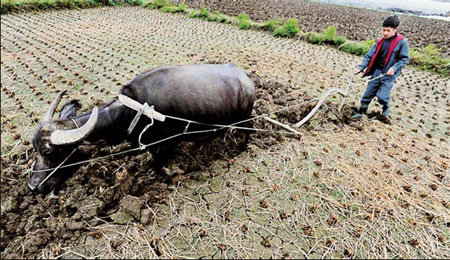|
A farmer plows a rice field in Guiyang, Guizhou province, in this file picture. The government has drafted a law on land-use rights to settle disputes in rural areas on a priority basis. [China Daily] |
Conflicts over land-use rights in rural areas would be minimized if the National People's Congress (NPC) passes a draft law.
The country's first draft law on arbitration of disputes over land-use rights was tabled at a six-day, bi-monthly session of the top legislature yesterday.
The draft, submitted for first reading, says arbitration should be completed within five working days and proceedings of a case ought to end within 60 days.
At least half of the arbitrators in a tribunal should be farmers or lawyers, and the rest, government representatives.
Disputes over land use currently fall under vague guidelines of the Arbitration Law and the Rural Land Contract Law. That causes overlapping of arbitration bodies, irregular work procedures and untimely settlement, Premier Wen Jiabao told the 11th NPC Standing Committee earlier.
The global financial crisis has hit the country's export-oriented economy hard, causing many factories in coastal areas to down shutters. This has forced more than 4 million unemployed migrant workers to return home early for Spring Festival, leaving many of them with no option but to work on their farms again.
All these make the draft law's first reading all the more relevant.
More and more people are returning to farming or other activities in rural areas. That has increased the number of land-use rights disputes and made them more diverse and complicated, says an NPC agriculture and rural committee document.
Disputes over land use have topped the Ministry of Agriculture's (MOA) petition list since 2003, with about 44 percent of all those received by the MOA in 2006 being land-related.
The same year, 200,400 disputes over land use were heard in the country, except the Tibet autonomous region. Nearly 90 percent of those were resolved through mediation, and 4.6 percent through arbitration, the MOA said.
The central government policy document issued in October allows farmers to lease their farmland or transfer their land-use rights.
"Setting up a settlement mechanism for disputes over land use would benefit people in rural areas and ensure a harmonious and stable rural environment," Agriculture Minister Sun Zhengcai said.
About 4.6 percent, or 55.51 million mu (9.1 million acres) of China's (except Tibet autonomous region) arable farmland was transferred - mainly through sub-letting and rent - in 2006. More land is likely to be transferred because the October document encourages large-scale farming.
At the same time, though, the government has vowed to set up "the most stringent farmland protection system" and urged local authorities to firmly safeguard at least 1.8 billion mu (120 million hectares) of arable land, the minimum needed to ensure food safety.


